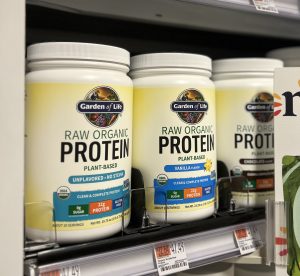Certain Protein Powders May Contain High Levels of Lead and Other Metals
 A Consumer Reports investigation found that some protein shakes and powder include dangerous levels of lead. The published report includes an analysis of 23 protein shakes and powder containing plant-based, beef and dairy proteins. It determined that more than 2/3 of the shakes and powders included more lead in a single serving than what experts believe is safe to consumer. The safe amount to consume is about .5 mcg in a day. If you believe you were harmed as a result of protein shakes or powder, you should call the knowledgeable Chicago-based attorneys of Moll Law Group about your claim. Billions have been recovered in cases with which we’ve been involved.
A Consumer Reports investigation found that some protein shakes and powder include dangerous levels of lead. The published report includes an analysis of 23 protein shakes and powder containing plant-based, beef and dairy proteins. It determined that more than 2/3 of the shakes and powders included more lead in a single serving than what experts believe is safe to consumer. The safe amount to consume is about .5 mcg in a day. If you believe you were harmed as a result of protein shakes or powder, you should call the knowledgeable Chicago-based attorneys of Moll Law Group about your claim. Billions have been recovered in cases with which we’ve been involved.
Call Moll Law Group About Your Claim
Many people are trying to incorporate more protein in their daily routine. One way they do that is to add protein shakes or powders. Unfortunately, the report and tests have discovered that the metal contamination in protein supplements is widespread and has worsened since prior testing 15 years before. The lead in the plant-based protein items were around nine times the amount in whey or beef-based protein. The highest amounts of lead were in Huel’s Black Edition, which had 6.3 micrograms of lead in a single serving or around 1290% of Consumer Report’s daily lead limit, and Naked Nutrition’s Vegan Mass Gainer, which included 7.7 micrograms of lead in each serving or around 1570% of the daily lead limit; the report categorized these as products to avoid. One serving of Huel’s Black Edition also included 9.2 micrograms of cadmium, which is more than twice the amount that experts say could be harmful to consume daily.
Other powders that were tested and contain lead between 400-600% of Consumer Report’s lead limit were Momentous’s 100% Plant Protein and Garden of Life’s Sport Organic Plant-Based Protein. Consumer Reports advised consumers to drink these only once a week. Muscle Meds’ Carnivor Mass powder had lead at more than 200% of Consumer Reports’ lead limit. Six other plant-based powders, along with 5 dairy-based powders and shakes and one beef-based powder.
 Illinois Injury and Mass Tort Lawyer Blog
Illinois Injury and Mass Tort Lawyer Blog






 Southwind Foods, LLC has had a series of recalls due to possible radionuclide (Cesium-137) contamination. There are widespread traces of Cs-137 in the environment, but they can be found in higher levels in water or food that’s been produced in an area that is environmentally contaminated. Repeated low-level exposure to contaminated food or water can be dangerous because it can elevate the risk of cancer. If you believe you were harmed by
Southwind Foods, LLC has had a series of recalls due to possible radionuclide (Cesium-137) contamination. There are widespread traces of Cs-137 in the environment, but they can be found in higher levels in water or food that’s been produced in an area that is environmentally contaminated. Repeated low-level exposure to contaminated food or water can be dangerous because it can elevate the risk of cancer. If you believe you were harmed by  Hillshire Brands Company recently issued a
Hillshire Brands Company recently issued a  The global demand for plush elf dolls or “Labubus” owned by celebrities like Rihanna, Kim Kardashian, and K-pop star Lisa of Blackpink has given rise to
The global demand for plush elf dolls or “Labubus” owned by celebrities like Rihanna, Kim Kardashian, and K-pop star Lisa of Blackpink has given rise to  Recently, TTI Outdoor Power Equipment
Recently, TTI Outdoor Power Equipment  This year, on October 9th, Moll Law Group is excited to celebrate Children’s Environmental Health Day (CEH Day)! CEH Day is an annual celebration of children’s environmental health successes and a day to raise the visibility of issues and challenges in the field. It’s also a day to drive collective action to address the big challenges facing our little ones.
This year, on October 9th, Moll Law Group is excited to celebrate Children’s Environmental Health Day (CEH Day)! CEH Day is an annual celebration of children’s environmental health successes and a day to raise the visibility of issues and challenges in the field. It’s also a day to drive collective action to address the big challenges facing our little ones. On August 28 of this year, certain electric motors found in Air Vent’s gable- and roof-mounted attic fans sold from August 2003-December 2013 were
On August 28 of this year, certain electric motors found in Air Vent’s gable- and roof-mounted attic fans sold from August 2003-December 2013 were  Recently, Ford recalled
Recently, Ford recalled  On July 16, DermaRite Industries, LLC put in place a voluntary recall of certain products because of the possibility of microbial contamination from
On July 16, DermaRite Industries, LLC put in place a voluntary recall of certain products because of the possibility of microbial contamination from  A new danger has emerged in vape shops and at gas stations and corner stores. Health officials warn that a concentrated kratom byproduct called 7-OH is being produced and marketed in ways that appeal to kids, and can be bought easily, even though it is believed to have effects and impacts similar to those of opioids. The 7-OH products are available to consumers in a range of forms and packages such as candy, fruit-flavored gummies, ice cream cones, drink mixes and shots, and tablets. Officials worry these products may represent the next stage of the opioid crisis. The FDA has
A new danger has emerged in vape shops and at gas stations and corner stores. Health officials warn that a concentrated kratom byproduct called 7-OH is being produced and marketed in ways that appeal to kids, and can be bought easily, even though it is believed to have effects and impacts similar to those of opioids. The 7-OH products are available to consumers in a range of forms and packages such as candy, fruit-flavored gummies, ice cream cones, drink mixes and shots, and tablets. Officials worry these products may represent the next stage of the opioid crisis. The FDA has